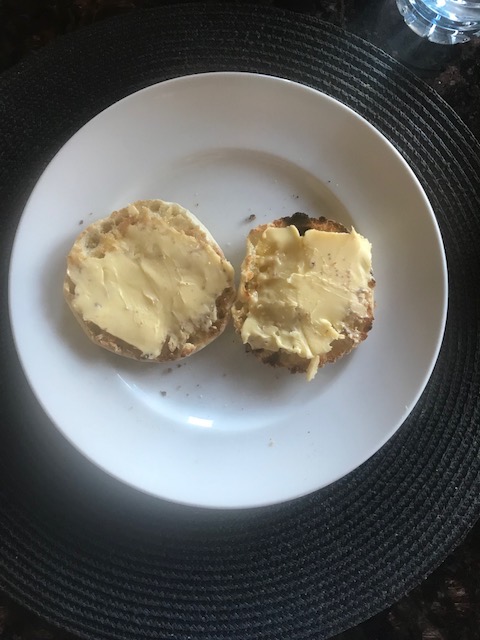English Muffin Psychology
Disambiguation
Since I got it so wrong about the banana thermometer, let me make clear that I'm writing about the psychology of the consumption of English muffins, NOT the psychology of muffins that happen to be English as opposed to, for example, corn.
Hard Science vs. Soft Science
"Yesterday's" blog about was about Physics, a "hard" science. Notwithstanding my goofy theories about dark matter, cold fusion, and the symbol for oganesson, I don't think I wrote anything unscientific. (There's nothing unscientific about being wrong.)
Psychology is a "soft" science, if you even consider it science at all. A recent controversy in that field seems to be about reproducing experiments and the difficulty of getting consistent result. With the exception of cold fusion, physics experiments tend to have the same results within a typically small margin of error. When they don't, scientists don't get cranky, they get excited and look for explanations in "new physics." Psychology tends to involve humans instead of things, and contradictory experiments often elicit recriminations, and vexation.
An Accidental Experiment Involving The Human Writing This Blog
 |
The photograph at the left represents an experimental object. It is an English Muffin (Thomas' brand, original), prepared by performing a horizontal bisection and coating both of the newly exposed surfaces with almost enough butter. The muffin as manufactured has an asymmetry that results in one "half" being somewhat smaller and less massive than the other. My personal Total Muffin Consumption isn't regulated by supply constraints and I typically dispose of from two to four semimuffins per week depending on what else happens to be on offer for breakfast. |
Oh What a Giveaway!
At least I think it is. One occasionally reads in non-specialist publications about experiments involving, e.g., children and marshmallows. Give a kid a marshmallow and tell him if he can avoid eating it for an hour, he'll get a second one when the experimenter returns. I seem to remember that the kids who can't defer gratification inevitably end up as swindlers or murderers, or at least as charges of society. The ones who are willing to wait for a second one end up as tycoons with big money bins, à la Scrooge McDuck. At least that's what the results imply; it being psychology there are probably many exceptions.
It's hard to perform this experiment on adults. They tend to be more sophisticated and in any event don't like marshmallows as much as they used to in their guinea pig days. But the semi-muffin experiment I unwittingly performed on myself would seem to be the equivalent, untainted by any adult sophistication. Does this mean I have a big money bin? No, but in addition to a large jar of M&Ms that I consume judiciously, I have recognized in myself a general tendency to not be impulsive about spending and consuming. I'm often content, for example, to wait for the next model cellphone even if the current model has some desirable features.
But not always.
Hey! Here's Another One
Do you park facing in or out? If you're not about to commit a crime from whose vicinity a quick getaway is needed, both parking styles seem to be equivalent. Head in, it takes a bit longer to leave. Head out, it takes longer to park but reduces your departure time. In other words, there's no special advantage to either method, but an observer (from a safe distance if I'm the one who's parking) might infer whether the driver is a delayed-gratification specimen.
I almost inevitably park heading in. This is psychology, not physics.


